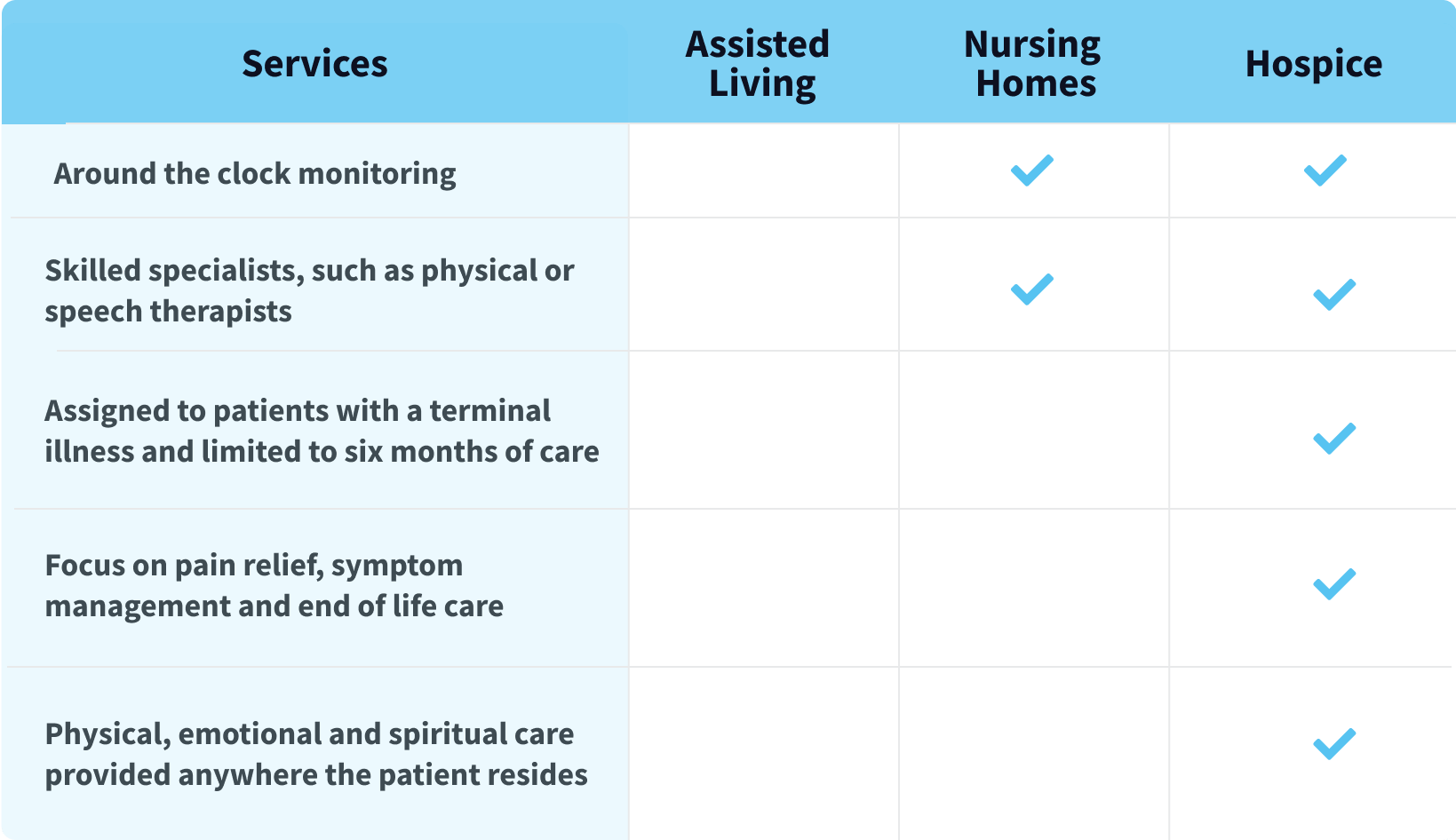Get Your Free Mesothelioma Guide

Find a Top Mesothelioma Doctor

Access Help Paying for Treatment

Assisted living facilities are communities that provide patients access to more personal care services than they would receive in an independent living community but fewer medical services than a skilled nursing facility can provide. At these facilities, care is highly personalized to each patient's level of ability, and patients are encouraged to ask for as much help as they need. Most facilities handle all of the residents' housekeeping, cooking and laundry duties, and patients may request extra assistance with bathing, dressing, eating and toileting.

The care model at these facilities is ideal for patients who struggle with daily activities and need more help than a home caregiver can provide. Patients typically enter assisted living facilities when their responsibilities become too overwhelming. Approximately 300,000 people move into these facilities each year.
Assisted living facilities typically provide their residents with three meals each day, light housekeeping and laundry services, social programs and transportation. These services are standard and are typically included in the monthly cost of room and board. Mesothelioma patients may benefit from having reduced responsibilities as their illness progresses and their symptoms, such as shortness of breath and exhaustion, make chores seem overwhelming.

Assisted living is not a nursing home, which is now called a skilled nursing facility. There are many tasks and duties that assisted living nurses and staffers do not perform. Medical services at these facilities are limited. However, an August 2021 report found that assisted living facilities often utilize advanced technology, such as wearable devices and personalized software.
Regulations regarding which medical services a facility can provide vary from state to state. In some states, nurses can check vital signs and blood sugar, while in other states nurses can only administer medicine.
Assisted living facilities are almost always private pay facilities. That means a patient, a patient’s trust or a patient’s family takes care of the costs unless a health insurance policy is in place and specifically calls for this type of care.
Costs differ by city and state. Generally, the higher the cost of living in an area, the more a facility costs. A typical monthly cost is $2,800 to $3,500, although some new or upgraded facilities can cost more. Medicaid sometimes provides $1,000 a month in coverage.
Veterans are sometimes eligible for even more coverage, although the Veterans Administration claims process is notoriously slow. Veterans can get up to $1,650 a month in coverage for assisted living, while veterans’ spouses may be eligible for up to $1,000 a month. However, the wait list for claims processing is long, and veterans should expect to pay for their coverage up front with the hope of being reimbursed later by the VA. It is not uncommon for VA reimbursements to take a year to reach the veteran.
With more than 36,000 assisted living communities nationally, patients have numerous options when deciding on a new home. Choosing a facility may take some time, and patients should visit several facilities in their area to decide where they feel the most at home. Ask your family to go with you on the tours, and consider their opinions. Getting ideas and opinions from support groups can be helpful as well.
Get Your Free Mesothelioma Guide

Find a Top Mesothelioma Doctor

Access Help Paying for Treatment

One way to select a facility and to do so with confidence is with the help of an elder advocate group or company. Because of the increased complexity of Medicare drug programs, advocate companies exist in many major cities. They are typically for-profit businesses, although some cities and states have elder advocate nonprofits.
These companies and nonprofits usually know about every facility in the area. They should know amenities of many of them and specific costs involved. The advantage of using one of these groups is that they usually have relationships with the facilities. Often they can make turnkey the process of getting someone into an assisted living facility. Many times they also offer other services after the fact – making sure doctors and nurses are doing the work they are paid to do and ensuring that medications are being taken, etc. – but those services are ones the patient or family can decide as an add-on to selecting a care facility.

Understand your diagnosis, top doctors and ways to afford care.
Get Your Free GuideAt some point, though, you will want to visit an assisted living facility before committing to one. While visiting, learn as much as possible about the living conditions, meal plans, activity schedules, security measures and house rules. Talk to current residents and ask them whether they would recommend the facility. Be sure to request a full tour, and when possible, ask to be included in a social activity or meal at the facility. After your initial visit, you may consider dropping by for a surprise visit to see how day-to-day operations are managed when the facility is not expecting visitors. Conditions should be the same as they were on your first visit.
It is possible for someone with mesothelioma to live in an assisted living facility and to be under hospice care. The only regulation is that curative cancer treatments must be halted before hospice will agree to come into the facility.
At the same time, it is important to understand that a patient can decide to end hospice care at any point if a decision about joining a new clinical trial or trying a new treatment method is made. Hospice will return again is asked but only if treatments are ceased.
Recommended ReadingYour web browser is no longer supported by Microsoft. Update your browser for more security, speed and compatibility.
If you are looking for mesothelioma support, please contact our Patient Advocates at (855) 404-4592
The Mesothelioma Center at Asbestos.com has provided patients and their loved ones the most updated and reliable information on mesothelioma and asbestos exposure since 2006.
Our team of Patient Advocates includes a medical doctor, a registered nurse, health services administrators, veterans, VA-accredited Claims Agents, an oncology patient navigator and hospice care expert. Their combined expertise means we help any mesothelioma patient or loved one through every step of their cancer journey.
More than 30 contributors, including mesothelioma doctors, survivors, health care professionals and other experts, have peer-reviewed our website and written unique research-driven articles to ensure you get the highest-quality medical and health information.
My family has only the highest compliment for the assistance and support that we received from The Mesothelioma Center. This is a staff of compassionate and knowledgeable individuals who respect what your family is experiencing and who go the extra mile to make an unfortunate diagnosis less stressful. Information and assistance were provided by The Mesothelioma Center at no cost to our family.LashawnMesothelioma patient’s daughter


Whitmer, M. (2025, June 5). Mesothelioma Patients and Assisted Living. Asbestos.com. Retrieved July 17, 2025, from https://www.asbestos.com/support/patients-assisted-living/
Whitmer, Michelle. "Mesothelioma Patients and Assisted Living." Asbestos.com, 5 Jun 2025, https://www.asbestos.com/support/patients-assisted-living/.
Whitmer, Michelle. "Mesothelioma Patients and Assisted Living." Asbestos.com. Last modified June 5, 2025. https://www.asbestos.com/support/patients-assisted-living/.
Michelle Whitmer has covered science and medicine for Asbestos.com for more than 15 years. She has been featured in multiplatform media, including The New York Times and KYW Newsradio. Whitmer is pursuing American Medical Writers Association certification, has completed OSHA Asbestos Standard for the Construction Industry training and is CDC certified in Health Literacy.
Our fact-checking process begins with a thorough review of all sources to ensure they are high quality. Then we cross-check the facts with original medical or scientific reports published by those sources, or we validate the facts with reputable news organizations, medical and scientific experts and other health experts. Each page includes all sources for full transparency.
Please read our editorial guidelines to learn more about our content creation and review process.
